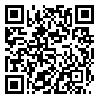BibTeX | RIS | EndNote | Medlars | ProCite | Reference Manager | RefWorks
Send citation to:
URL: http://ijpcp.iums.ac.ir/article-1-359-en.html
Abstract
Objectives: Since epistemological beliefs can be the basis for description of important educational issues such as goals of educational improve-ment, this research examined the effect of epistemological beliefs on goal achievement.
Method: In a prospective study, epistemological beliefs and improve- ment goals were evaluated based on Schommer’s theory and Elliot and McGregor’s pattern of achievement goals respectively. Subjects consisted of 387 students (234 female, 153 male) from different fields of study in the
Results: Belief in quick learning (p<0.001) was negatively associated with mastery-approach, mastery-avoidance and performance-approach goals. Belief in certain knowledge was positively associated with mastery-avoidance goal (p<0.05). Also, belief in fixed ability was positively associated with performance-approach and performance-avoidance goals (p<0.05). Finally, belief in simple knowledge was positively associated with performance-avoidance (p<0.01).
Conclusion: The epistemological beliefs of students have significant effects on their improvement goals.
Received: 2008/03/10 | Published: 2008/02/15
| Rights and permissions | |
 |
This work is licensed under a Creative Commons Attribution-NonCommercial 4.0 International License. |



